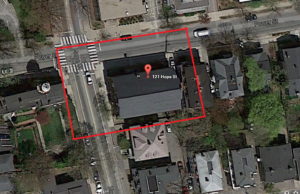PUBLIC NOTICE
Regarding the National Endowment for the Humanities’ Section 106 Review of
the Rhode Island Historical Society Library Upgrades
The National Endowment for the Humanities (NEH) has awarded the Rhode Island Historical Society (the Historical Society) a grant to protect an important collection of Rhode Island historical material by installing a new heating, ventilating, and air conditioning system; new energy-efficient windows; an addressable fire alarm system; and emergency lighting. In addition, a structurally failing fire escape would be replaced with a new one. NEH is an independent grant-making agency of the United States government dedicated to supporting research, education, preservation, and public programs in the humanities. This public notice is issued as part of NEH’s responsibilities under 36 C.F.R. Part 800, the regulations which implement Section 106 of the National Historic Preservation Act (NHPA) of 1966, as amended, 16 U.S.C. § 470. NEH, a funding agency, is required by regulation to identify and assess the effects of any proposed actions on historic properties. If any proposed action will have an adverse effect on historic resources, NEH works with the appropriate parties to seek ways to avoid, minimize, or mitigate any adverse effects. Additionally, the Section 106 regulations require NEH to consider the views of the public on preservation issues when making final decisions that affect historic properties.
In its project, the Historical Society proposes to protect collections by:
- Installing a high-efficiency heating, ventilating, and air conditioning (HVAC) system;
- Replacing deteriorated windows with new energy-efficient windows;
- Installing an addressable fire alarm system and emergency lighting; and
- Replacing a structurally failing fire escape with a new one.
The Rhode Island Historical Society, founded in 1822, is the oldest and largest historical organization in Rhode Island and the fourth-oldest in the United States. The Society’s Library, at 121 Hope Street, Providence, Rhode Island, is a 15,800 sq. ft. building originally built in 1874 as a church (the Power Street Methodist Church) and remodeled in 1928 to serve as a branch of the Providence public library. The Historical Society purchased the building in 1963. Although the building itself has no individual historic designation, it lies within the Power Street-Cooke Street National Historic Register district in Providence, RI. The Power Street-Cooke Street Historic District, a residential area of six and one half blocks long, includes notable examples of Greek Revival, Victorian, and Colonial Revival style structures dating from 1738 through the twentieth century.
The Rhode Island Historical Preservation and Heritage Commission, which holds a protective exterior easement on the Library building (granted in 2009), reviewed the Historical Society’s plans and held substantive conversations with the architects regarding details of the project.
The Providence Historic District Commission issued a Certificate of Appropriateness on April 4, 2014, for the Historical Society’s plans to alter the structure.
In a letter dated 3 March, 2014, the State of Rhode Island and Providence Plantations Historical Preservation & Heritage Commission wrote: “Based on our review of the information that was submitted and that which we have subsequently obtained, it is the conclusion of the RIHPHC that the proposed project will have no adverse effect on historical resources provided that the windows on the building façade (west elevation) have clear glass, rather than spandrel and translucent glass as proposed. Spandrel and translucent glass may be used elsewhere on the building. These comments are provided in accordance with Section 106 of the National Historic Preservation Act.” Per the RIHPHC’s stipulation, the Historical Society and the project’s architects have informed NEH that the project will utilize clear glass in the windows on the west elevation to avoid any adverse effect.
As required by Section 106, NEH is providing the public with information about this project, as well as an opportunity to comment on any knowledge of, or concerns with, historic properties in the proposed project area, and issues relating to the project’s potential effects on historic properties. Comments may be submitted to the NEH by e-mail to preservation@neh.gov, or to National Endowment for the Humanities, Division of Preservation and Access, 1100 Pennsylvania Ave., NW, Room 411, Washington, DC 20506. The deadline for submitting comments is May 8, 2014.

